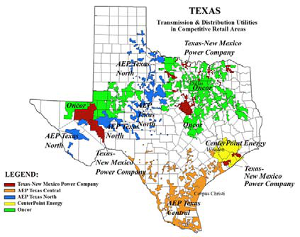
Texas is regularly recognized as the best electricity market in the country. The 2012 ABACCUS report ranked the state number one in competitive residential market and industrial and commercial markets for the sixth year in a row. But those regulating the state?s electricity market are not content as reliability issues continue to surface.
The ERCOT (Electric Reliability Council of Texas) 2013 forecast shows a 13.75 percent reserve margin between supply and demand, which is uncomfortably tight but an improvement over earlier projections. The reserve margin is the safety cushion between the amount of available capacity in the system and anticipated demand. Having adequate reserve margin helps protect consumers against an unexpected loss in capacity or an unexpected spike in demand.
In February 2011, Texans experienced an unexpected loss in capacity when a powerful winter storm brought a handful of power stations down, forcing officials to implement rolling brownouts in parts of the state, including the Dallas/Fort Worth area. A spike in demand occurred late that same year when a record heat wave caused record electricity consumption as Texans from Houston to Dallas cranked up their air conditioners and operators struggled to avoid blackouts.
In light of these rare events, the staff of the Sunset Advisory Commission issued a report pushing for additional regulations on businesses in the electricity marketplace. The report recommended quadrupling the fines to $100,000 per violation per day for any electric industry participants? violations of ERCOT?s reliability protocols or Public Utility Commission’s wholesale reliability rules and granting emergency cease and desist authority to the state Public Utility Commission (PUC). However, the report provides little to no evidence of how these controls will prevent future blackouts.
Thankfully the twelve member sunset commission chose not to implement additional fees, but they did move forward with granting the PUC emergency cease and desist authority, clarifying that PUC?s authority to issue an emergency cease-and-desist order does not include fraudulent activities.
Increasing risk for electricity companies through stronger PUC sanctions will not increase reserve margins. Creating additional regulatory risk only makes electricity more expensive to produce and a cease and desist order would do nothing to help create more electricity when reserve margins are low.


